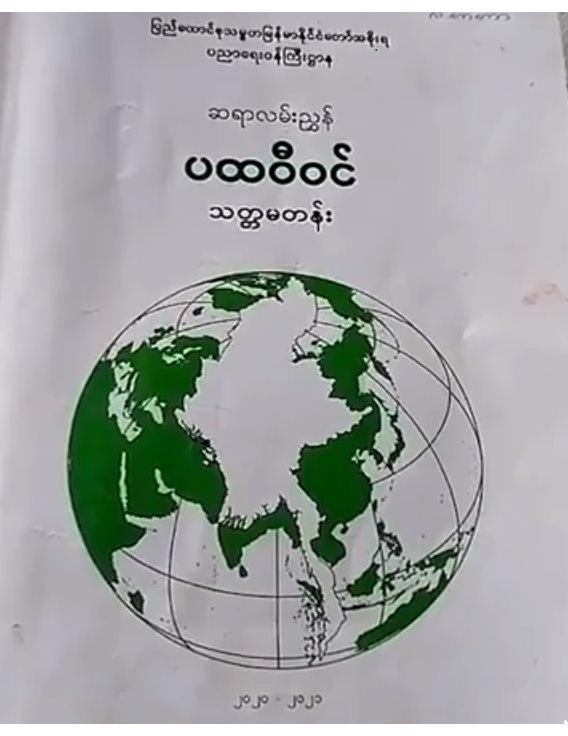Anthony
The related local ethnic tribes pointed out the misinformation and spelling of the names and customs of Kayah (Karenni) State which is presented in Grade-7 new curriculum.
The Chairperson of Kayah Literature and Culture Committee (KnLCC), Khu Phe Nyoe Reh, said it is a mistake to present our Kayah(Karenni)’s precious names and customs with misinformation and spelling in Teacher Manual Book. It is mistakenly presented that they mentioned only Deeku Festival whereas it has to be called as Eh Doh Paw Mi Festival (so-called) Deeku Festival, and the wrong spelling of De Kuu’ whereas it should be spelled as Deeku; besides they also wrongly gave the festival name as New Harvest Festival (known as Kauk Thit Sar Pwe).
In previous 2017-2018 Kayah National Conference, it was officially approved to use only Eh Doh Paw Mi Festival instead of Deeku Festival.
“However, other ethnic groups, who want to use it easily, is still using the name “Deeku”. In the present day, we altogether reaffirmed to officially use and call as state-wide “Eh Doh Paw Mi” which was agreed on last 2017-2018 conference, held in Htay Nga Lyar Village. Therefore, “Eh Doh Paw Mi” have been using extensively among residents.”
On page 31-21 of student textbook, it also mispresented that Eh Doh Paw Mi Festival is a Sticky rice Dumpling Festival.
Ko Kyaw Htin Aung said it can lead to divisions or disunity among ethnicities if the children were to be taught across the nation with the ethnics’ unacceptable misinformation which already misunderstood for decades.
“If they really want the positive impact, they should publish this new curriculum only after the advance negotiation is done with related indigenous people. Otherwise, it would result negative impact because of their division of one ethnic group into four groups, or using the local undesired names and inputting in the curriculum. By doing like this, it could occur negative impact on federal union and harm vastly to the unity and solidarity of ethnic nationalities.
Besides, they also misspelled the tribes’ names “Kayan” and “Gay Bar”. Not only that, they also separated the Kayan tribe into four sub-groups – Zayein, Gay Kho, Kayan (Padaung), and Yin Baw – where it is same formed under Kayan. Regarding to it, the Board Director of LAIN Technical Support Group, Kyaw Htin Aung, pointed out those misspellings.
In 2017, thousands of people from various Kayan organizations convened a conference and signed the declaration that the combination of these four tribes represent “Kayan”, and yet it has been submitted to the government and relevant ministries.
The names of the four Kayan tribes were also renamed as Zayein=Kayan (La Hta), Kayan (Padaung)=Kayan (Lavi), Gay Kho=Kayan (Gay Kho), and Yin Baw=Kayan (Kangan), and it was ratified in 2017 that all of those tribes represent as one tribe.
The Head of the Kayah State Education Department, U Luciano, said that it is directly related to the Basic Education Department and Curriculum Team concerned with these misspelling and naming of the tribes.
“It has to do with the curriculum team under the Department of Basic Education. That’s not something we can answer on it. In fact, the curriculum planner should ensure on it, like the usage which everyone can accept.”
Luciano added that the ethnic groups themselves need to specify the correct spelling of their ethnic names, and if any, they should re-correct it.
“The Cultural Committee Coordinator for Kayan Literature and Culture Committee, Daw Yin May, pointed out that the misrepresentation in the textbook was due to the poor field-visits of the government education ministries into the ethnic departments and literature committees.
“The misspelling is because they do not check carefully on it. As I said before, they should personally do field visit. In this state, we have ethnical departments. Even if we don’t have, they can ensure by visiting and checking at the cultural research and museums. If they can’t do field visit themselves, they should at least check through message or phone call.”
It is said the teachers have been instructed to teach the true information themselves as the government did not have time to correct the wrong books.
The Kay Kaw Village-middle school teacher, Daw Ywa Eh Paw, said the teachers and students in Kayah (Karenni) State are the local ethnic people and can teach the truth in teaching, however other divisions and states do not know the correct spelling and may teach as the misspelling in teaching, which is not good for future generations.
“If we continue to make the same mistake, as I said recently, it will become like there are two Kayan that the Kayan, spell with Burmese alphabet (n- ending sound), and the Kayan, spell with Burmese alphabet (m- ending sound). Some other unknown ethnic groups may think we have those different kinds of Kayan. Thus it is not good for our children in the future.”
It is said the wrongly printed textbooks have reached to the relevant education departments and are being processed of distribution by the respective schools despite the delay in opening the school in this COVID period.
It is said the terminology of the ethnic nationalities should be studied in depth, and the misrepresentation of the ethnic tribes is not happening only in Kayah State but also in some other ethnic groups in other states.


